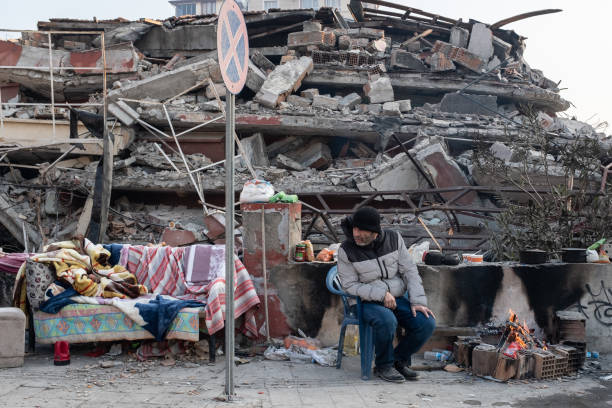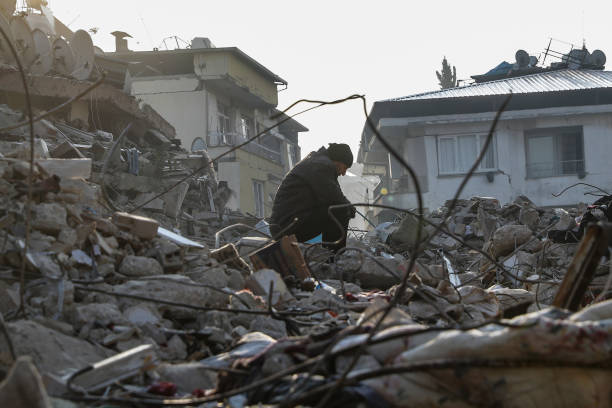Woman, 40, rescued alive from Turkey rubble more than a full week after earthquake
She had been trapped under the rubble of a five-storey building
A woman spent 170 hours buried under rubble before being rescued in Turkey, where officials are facing a losing battle to find survivors after two deadly earthquakes struck the country last week.
Sibel Kaya, 40, was trapped under the rubble of a five-storey building after the first of the two quakes struck the Islahiye district of Gaziantep province, reported the state-run Anadolu Agency.
Rescuers in Turkey pulled her out more than a week after she was trapped.
The magnitude 7.8 and 7.5 earthquakes struck nine hours apart in southeastern Turkey and northern Syria on 6 February, making it the sixth most deadly natural disaster this century, after a tremor in 2005 that killed at least 73,000 in Pakistan.
At least 33,185 fatalities have so far been reported as having due to the disaster. The death toll is expected to rise considerably as search teams find more bodies in towns and cities, inhabited by millions, that have been reduced to fragments of concrete and twisted metal.
Reports of miracle rescues have continued to pour in. A team pulled out 60-year-old Erengul Onder from debris in the town of Besni in Adiyaman province in the western city of Manisa.

“We received the news of a miracle from Besni which helped put the fire raging in our hearts a little,” tweeted Manisa mayor Cengiz Ergun.
On Sunday, rescue teams from Russia, Kyrgyzstan and Belarus pulled a man alive from a collapsed building about 160 hours after the quake struck, according to Russia’s Ministry of Emergency Situations.
“Rescue work to remove the man from the rubble lasted more than four hours,” the ministry said on the Telegram messaging platform, alongside a video showing rescuers taking a man from rubble and carrying him away.
“The work was carried out at night with a risk to life coming from a possible collapse of structures.”
A father and daughter, a toddler and a 10-year-old girl were among other survivors pulled from the ruins of collapsed buildings in Turkey on Sunday.
Such scenes of rescue are, however, becoming rare due to the limits of the human body’s ability to survive without water, especially in sub-freezing temperatures.
At a funeral near Reyhanli, veiled women wailed and beat their chests as bodies were unloaded from lorries – some in closed wood and uncovered coffins and others wrapped in just blankets.
Some residents sought to retrieve what they could from the destruction.
Eduardo Reinoso Angulo, a professor at the Institute of Engineering at the National Autonomous University of Mexico, said the likelihood of finding more people alive is “very, very small now”.
Professor Angulo, the lead author of a 2017 study involving deaths inside buildings struck by earthquakes, said the odds of survival for people trapped in wreckage fall dramatically after five days, and become near zero after nine days, with certain exceptions.
David Alexander, a professor of emergency planning and management at University College London, also said the window for pulling people alive was “almost at an end”.

He said the odds were not very good to begin with – many of the buildings were so poorly constructed that they collapsed into very small pieces, leaving very few spaces large enough for people to survive in.
“If a frame building of some kind goes over, generally speaking, we do find open spaces in a heap of rubble where we can tunnel in,” he said. “Looking at some of these photographs from Turkey and from Syria, there just aren’t the spaces.”
Winter conditions further reduce the window for survival. Temperatures in the region have fallen to -6C (-21F) overnight.
“The typical way the body compensates for hypothermia is shivering – and shivering requires a lot of calories,” said Dr Stephanie Lareau, a professor of emergency medicine at Virginia Tech in the US.
“So if somebody’s deprived of food for a number of days and exposed to cold temperatures, they’re probably going to succumb to hypothermia more rapidly.”
The Independent is appealing for help in raising urgently needed funds following the deadliest earthquake to hit Turkey and Syria in almost a century.
For regular updates on the appeal sign up to our Morning Headlines newsletter by clicking here.
Additional reporting by agencies
Join our commenting forum
Join thought-provoking conversations, follow other Independent readers and see their replies
Comments
Bookmark popover
Removed from bookmarks